It’s hard to deny that anything worth having comes at a cost – literally. Whether it’s meditation apps, massage treatments or various wellness supplements, many of us will hand over our hard-earned cash in the quest to feel our best.
But how much are Brits actually spending on their well-being, and how is the rising cost of living affecting those spends?
We surveyed over 2,000 UK adults on their well-being spending habits to see just what our priorities are when it comes to achieving a feeling of zen. Here’s what we found…
The average person spends £104.40 a month on feeling good
In total the average Brit spends £104.40 a month on wellness products and services – amounting to £1,252.80 every year, and a lifetime spend of £101,476.80
The highest spend goes on supplements and superfoods, costing the average Brit £14.74 per month. This is followed by physiotherapy (£13.59 per month); wellness retreats (£13.11 per month); meditation and well-being classes (£12.88 per month) and meditation apps, on which Brits spend an average of £12.83 per month.
Where are Brits Spending the Most Money to Stay Well?
Superfoods and health supplements may be the main way Brits are looking after their well-being, but here’s what else they’re purchasing at least once per month:
- Vitamin supplements & superfoods – 34.6% (average spend: £14.74)
- Wellness treatments/services, including massage, acupuncture, reiki etc. – 20.1% (average spend: £12.61)
- Meditation apps – 19.6% (average spend: £12.83)
- Well-being/meditation classes – 18.9% (average spend: £12.88)
- Physiotherapy – 18.6% (average spend: £13.59)
- Wellness retreats – 18.6% (average spend: £13.11)
- Therapy service, online or off – 18.6% (average spend: £12.73)
- Life coaching – 17.8% (average spend: £11.91)
Vitamin supplements and superfoods are the most purchased items after healthy groceries, with over a third of Brits buying them once a month or more. This is followed by wellness treatments such as massage, acupuncture and reiki, in which a fifth of Brits indulge once a month or more. Meditation apps are the next most common purchase, enjoyed at least monthly by just less than a fifth of the population, while well-being and meditation classes are also a favourite with 19% of Brits purchasing once a month or more.
Which UK Cities are Spending the Most on Wellness?
We learned that the top 10 cities spending the most on their well-being are:
- London – average spend of £150.74 per month
- Cardiff – average spend of £133.90 per month
- Birmingham – average spend of £121.32 per month
- Norwich – average spend of £115.22 per month
- Manchester – average spend of £144.24 per month
- Glasgow – average spend of £103.61 per month
- Liverpool – average spend of £96.08 per month
- Nottingham – average spend of £95.02 per month
- Leeds – average spend of £93.98 per month
- Brighton – average spend of £82.40 per month
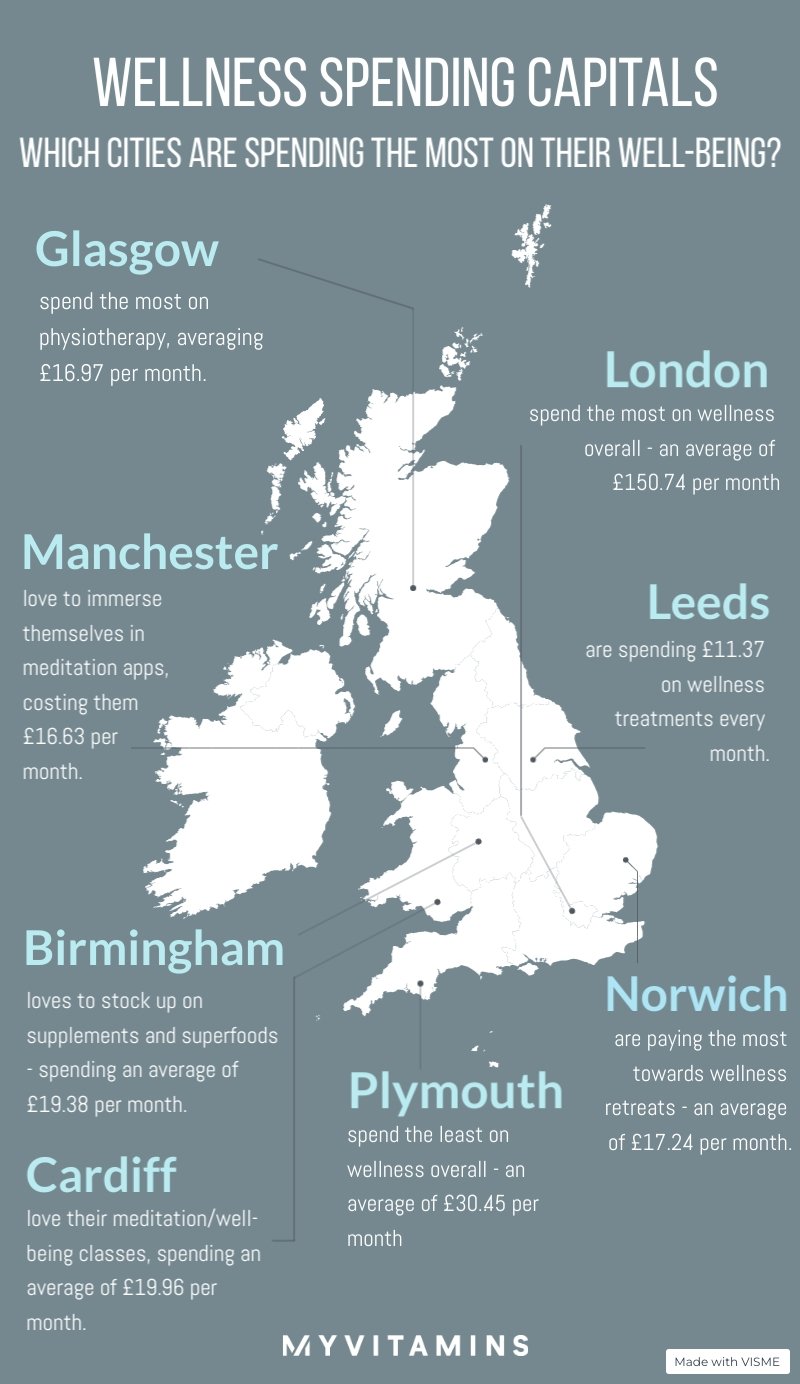
What Influences Our Wellness Spending Habits?
Only 14.6% of those surveyed said they’d be more likely to spend money on their mental health than their physical health (vs. 26.4% who said they’d be more likely to spend on their physical). 36% said they’d prioritise both equally – suggesting that the benefits of having strong mental health alongside physical are not lost on the public.
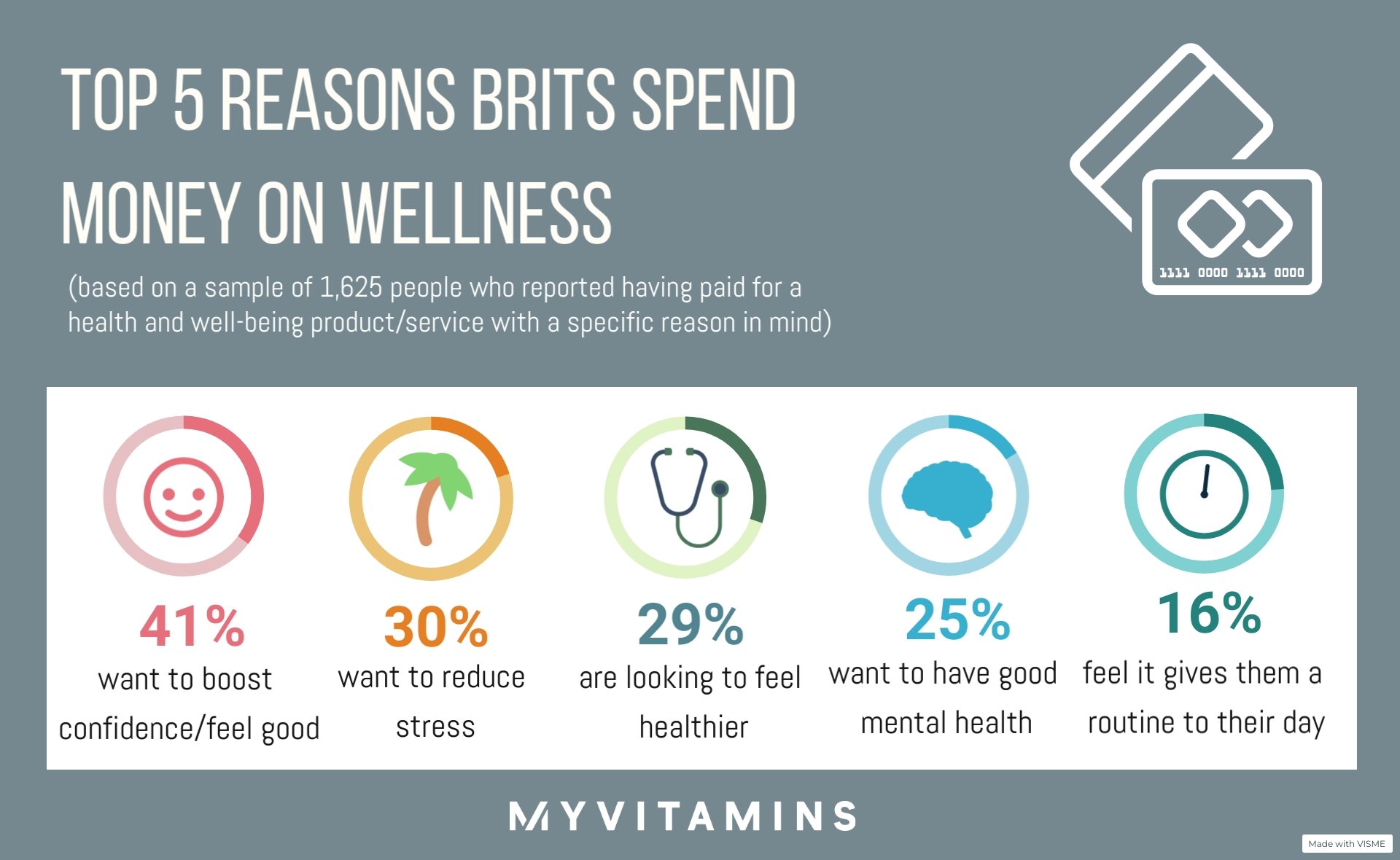
Among the 1,625 participants who admitted to paying for a wellness product or service with a specific goal in mind, their top reasons were to feel good or boost confidence (41.4%), reduce stress (30.2%), feel healthier (29%), maintain good mental health (25.1%) and have a routine to their day (15.6%).
The most common factor influencing which wellness products in particular people purchase is whether something looks good value for money (48.6%), as well as if it has positive reviews (29.4%). Other influencing factors are if a product seems good quality (28.6%), recommendations from family or friends (26.3%), and whether there is a Pay-As-You-Go option available (21.8%).
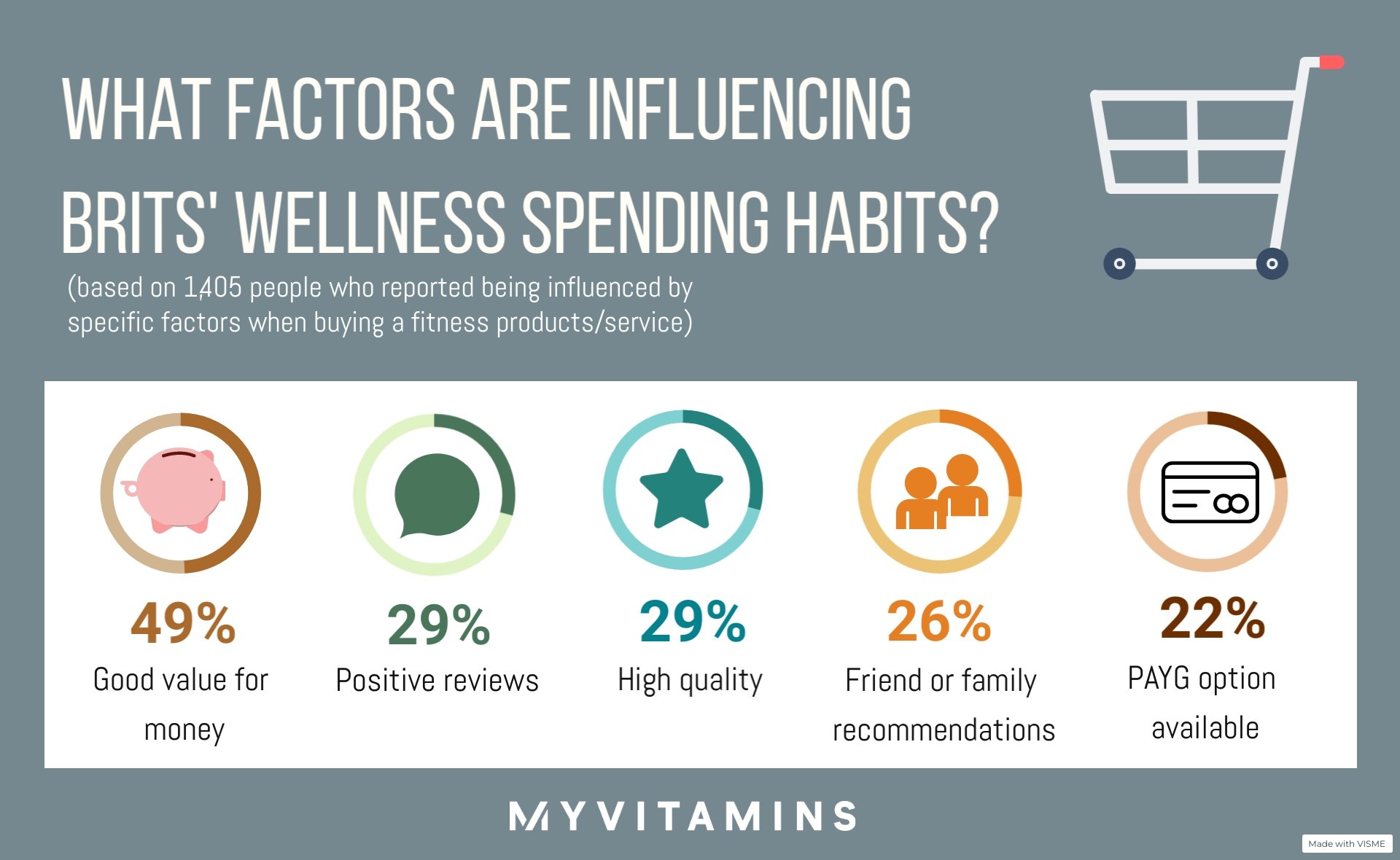
The fact that two out of the five top factors revolve around cost and pay method implies that money and affordability are very large considerations when choosing new wellness products. If something seems good value for money it means Brits are better able to justify the outgoing cost, while pay-as-you-go options give people an easy, affordable way to manage their budget.
Seeing an influencer promote something seems to have the least impact on people’s purchasing choices, with only 11% of respondents saying they are influenced by their favourite content creators.
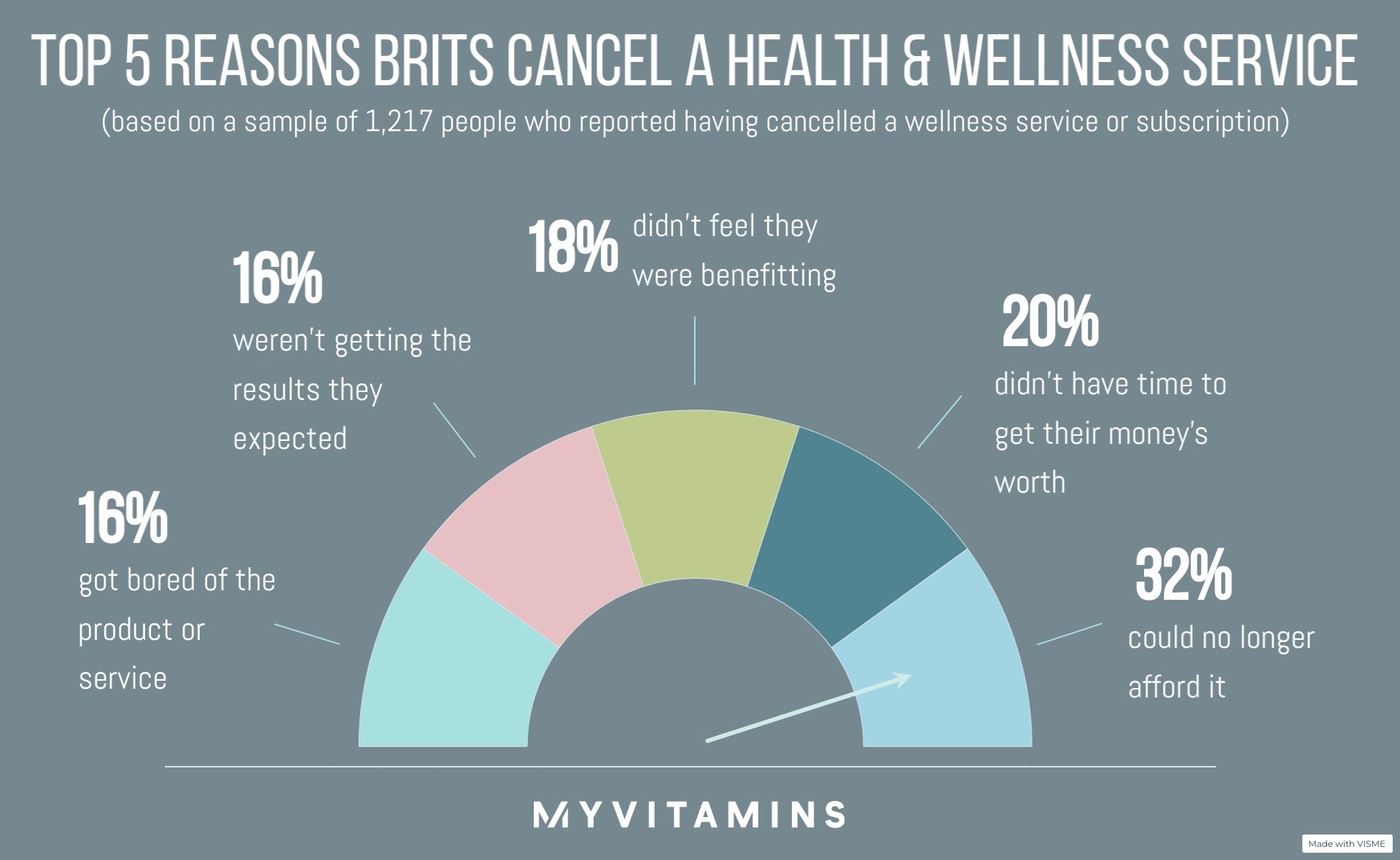
Among the 1,217 Brits who reported having cancelled a wellness product or service, the most common reason was no longer being able to afford it (32%), followed by not having enough time to get their money’s worth (20%). This is followed by not feeling any benefits (18%), not getting the results they expected (16%) or getting bored with the product or service (16%).
How is the cost of living affecting our wellness spending?
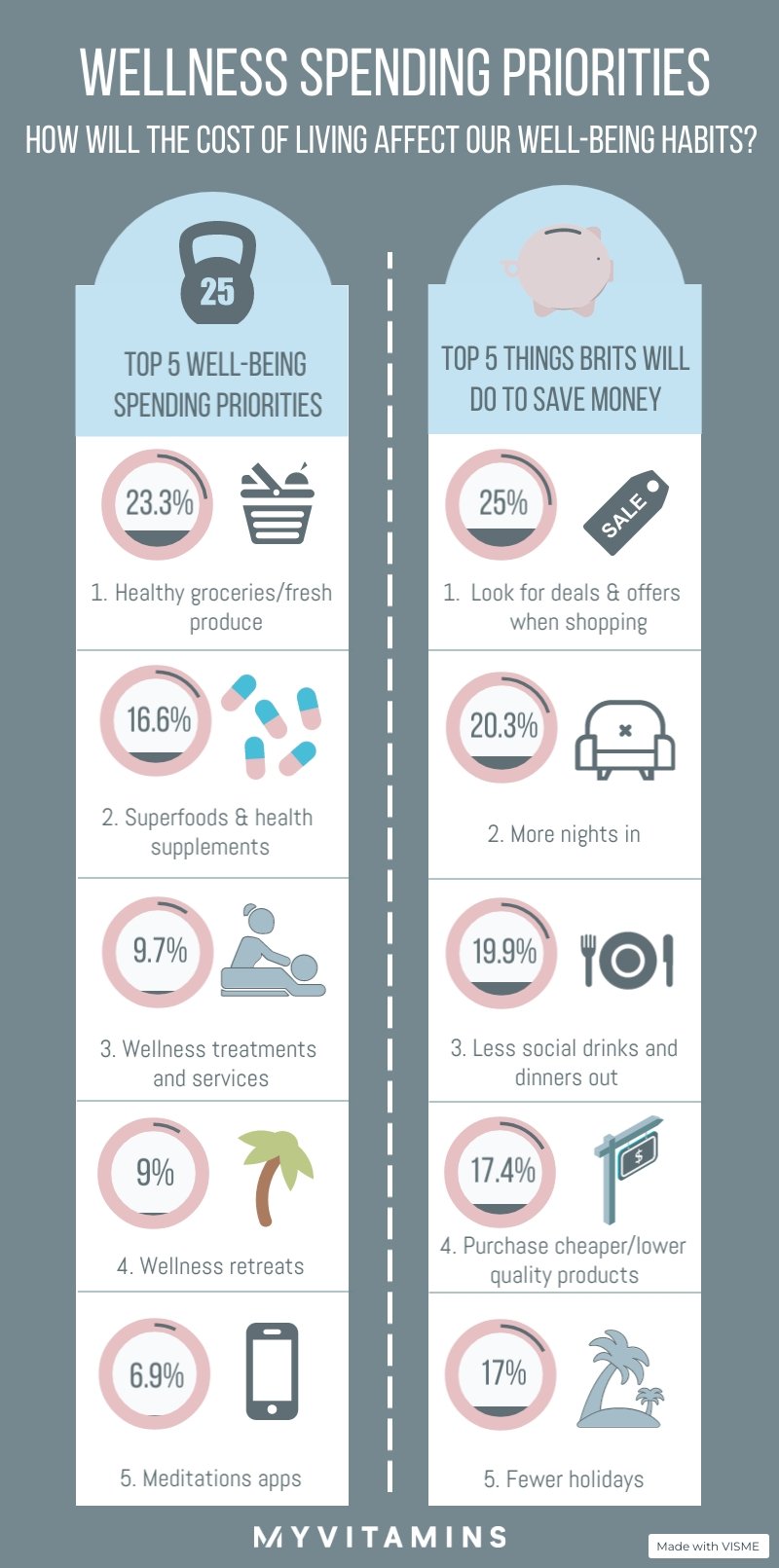
Over a fifth of Brits (22.4%) said that in the face of rising living costs, they will prioritise general health and wellness products, vs. 16.3% who said they’d prioritise gym and fitness products.
When it comes to the wellness products Brits want to prioritise, 23.3% said that healthy groceries will continue to be their main spending area, followed by general health supplements and superfoods (16.6%). This was followed by wellness treatments (9.7%), wellness retreats (7%) and meditation apps (6.9%), with meditation and wellness classes also being a priority (6.7%).
Expenses that may be the first to be cut include life coaching, with only 4.9% of people saying this would be a priority, followed by therapy services, online and off (5.9%) and physiotherapy (6.5%).
In order to continue to afford their favourite health and wellness products, Brits said they would be most likely to look at deals and offers when shopping (25%), followed by more nights in (20.3%) and less social drinks and dinners out (19.9%). 17.4% also said they would be willing to purchase cheaper, lower quality products while 17% said they would have fewer holidays.
Take Home Message
Even in the face of the rising cost of living, it’s clear that UK adults still have a passion for maintaining their mental health and well-being. Whether it’s their favourite meditation app, a well-deserved massage or their daily supplements, Brits know the things that keep them feeling good and are willing to do what it takes to keep their positive habits.
Methodology
We surveyed 2,045 UK adults on their spending habits regarding health, wellness and fitness products and services. Questions were multiple choice, with some questions providing the option to select more than one relevant answer and add additional qualitative data if needed.
Results were split by gender, age, city of residence and professional sector.
*Average lifetime spend calculated on the average life expectancy of 81 years (79 for men, 82.9 for women).








